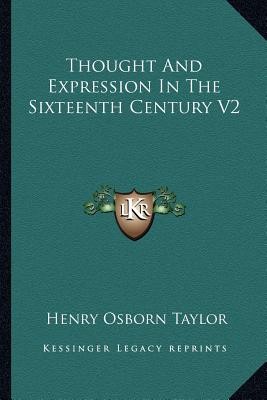
- We will send in 10–14 business days.
- Author: Henry Osborn Taylor
- Publisher: Kessinger Publishing
- ISBN-10: 1162954078
- ISBN-13: 9781162954073
- Format: 15.2 x 22.9 x 2.3 cm, minkšti viršeliai
- Language: English
- SAVE -10% with code: EXTRA
Thought and Expression in the Sixteenth Century V2 (e-book) (used book) | bookbook.eu
Reviews
Description
Purchase of this book includes free trial access to www.million-books.com where you can read more than a million books for free. This is an OCR edition with typos. Excerpt from book: CHAPTER III LORENZO, POLIZIANO, ARIOSTO, TASSO Touching the earlier humanists spoken of in the last chapter, one may ask, what advance of thought, what growth of human intelligence, what novelties of expression do they present? They drew inspiration from Petrarch and Boccaccio; and more unreservedly than had been possible in the Middle Ages, their minds were fixed upon the intellectual and artistic concerns of mortal life. They were disposed to love it all; only upon intrusive reminders would they doff their caps to the threats and promises of their religion. Palpably and, as it were, externally, their education and progress hung upon devotion to the antique, its study and its imitation. They brought to the reading of the classics a renewed openness of mind, and perceived their significance more truly than mediaeval students. The early fifteenth century to which they belonged had profited from the increase of wealth and the accumulation of experience. The fields of knowledge were broadening. And if Petrarch was a better classical scholar than anyone before him, he was surpassed by his successors, who availed of his example and accomplishment. Many lost classics had been brought to light by eager searches through forgotten places; and a century of devotion to the classics bore its fruit. The veritable progress of these men, so far as it existed, lay within themselves, although seemingly it issued from their studies. Those we have taken as examples were diligent and clever; and at least one among them showed an incisively critical intelligence. Yet intelligent and clever as were Valla, Filelfo, Poggio and Bruni, they do not appear to have evolved and compassed noveland interesting modes of expression, which are the sure proof and exponent of human progress. They were sti...
EXTRA 10 % discount with code: EXTRA
The promotion ends in 21d.17:45:26
The discount code is valid when purchasing from 10 €. Discounts do not stack.
- Author: Henry Osborn Taylor
- Publisher: Kessinger Publishing
- ISBN-10: 1162954078
- ISBN-13: 9781162954073
- Format: 15.2 x 22.9 x 2.3 cm, minkšti viršeliai
- Language: English English
Purchase of this book includes free trial access to www.million-books.com where you can read more than a million books for free. This is an OCR edition with typos. Excerpt from book: CHAPTER III LORENZO, POLIZIANO, ARIOSTO, TASSO Touching the earlier humanists spoken of in the last chapter, one may ask, what advance of thought, what growth of human intelligence, what novelties of expression do they present? They drew inspiration from Petrarch and Boccaccio; and more unreservedly than had been possible in the Middle Ages, their minds were fixed upon the intellectual and artistic concerns of mortal life. They were disposed to love it all; only upon intrusive reminders would they doff their caps to the threats and promises of their religion. Palpably and, as it were, externally, their education and progress hung upon devotion to the antique, its study and its imitation. They brought to the reading of the classics a renewed openness of mind, and perceived their significance more truly than mediaeval students. The early fifteenth century to which they belonged had profited from the increase of wealth and the accumulation of experience. The fields of knowledge were broadening. And if Petrarch was a better classical scholar than anyone before him, he was surpassed by his successors, who availed of his example and accomplishment. Many lost classics had been brought to light by eager searches through forgotten places; and a century of devotion to the classics bore its fruit. The veritable progress of these men, so far as it existed, lay within themselves, although seemingly it issued from their studies. Those we have taken as examples were diligent and clever; and at least one among them showed an incisively critical intelligence. Yet intelligent and clever as were Valla, Filelfo, Poggio and Bruni, they do not appear to have evolved and compassed noveland interesting modes of expression, which are the sure proof and exponent of human progress. They were sti...


Reviews